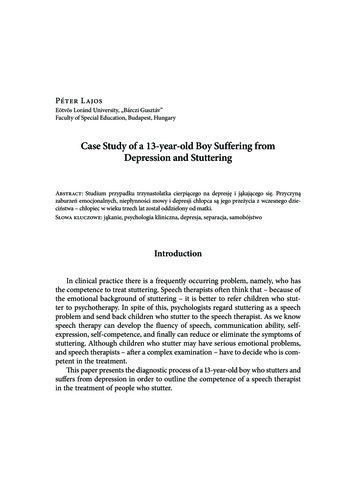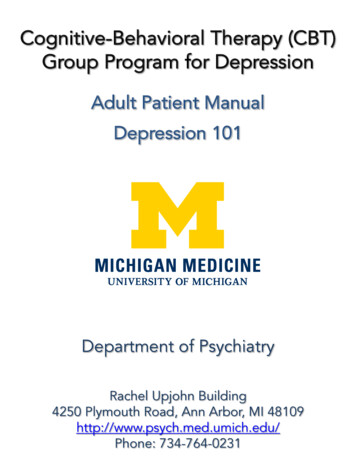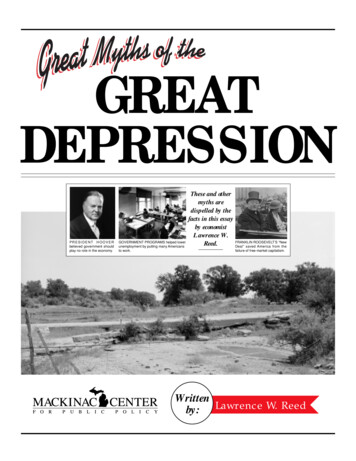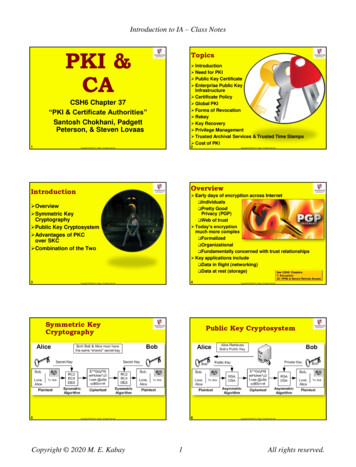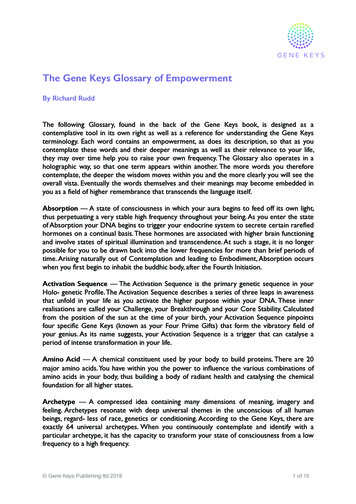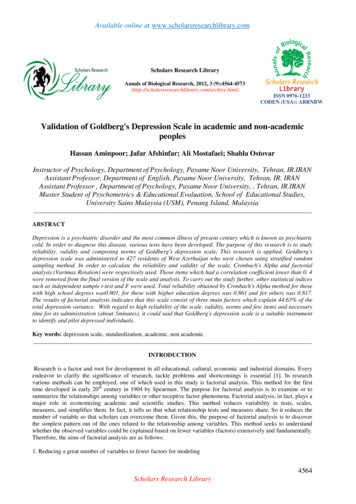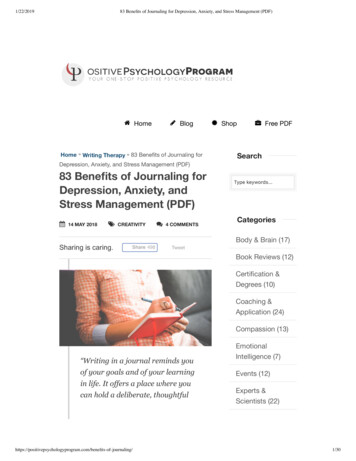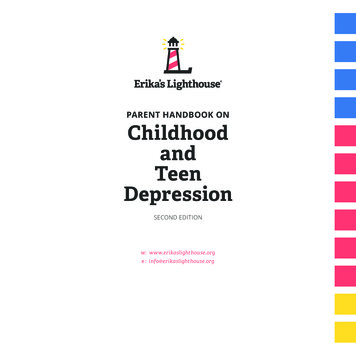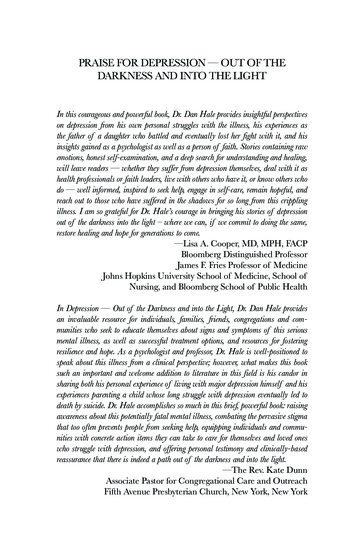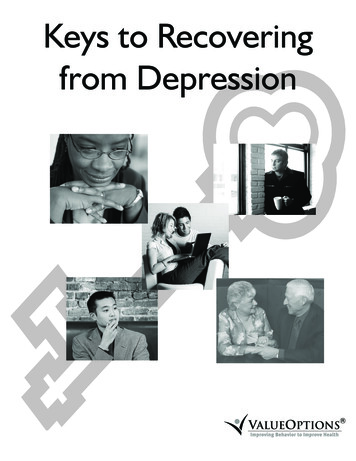
Transcription
Keys to Recoveringfrom Depression-1-
INTRODUCTIONDepression is a common and serious disorder. Every year, depression affects nearly 10% of adultAmericans over age 18. Depression takes a big toll in suffering, costs industry billions of dollars, andcan lead to suicide in some severe cases. Family, friends, health, work, or school can all be seriouslyimpacted by the disease. However, depression is a very treatable disease. There is hope.We have designed this workbook with three main goals in mind:First, for those who have already been diagnosed with a form of depression and are in treatment,we want to help you learn as much as you can about depression. We have included up-to-dateinformation about what depression is (and what it isn’t). There are some common myths aboutdepression. We believe that the more you understand about depression and the challenges youmay face like medication side effects, the more likely you are to get the full benefit of treatment.Wrong information about depression causes some people to stop treatment too soon or they maynot follow the treatment plan agreed upon with their doctor or therapist.Secondly, to help you start treatment for depression and stick with it. There are several treatmentoptions. Your doctor may recommend “talk therapy” or “counseling” or medication withantidepressants or a combination of both. These treatments have been shown to successfully treatdepression. A combination of medications and psychotherapy is used to treat many people. Yourdoctor can help you decide what may work best for you.Third, although treatment for depression is helpful for most people, there are things that youcan do in addition to treatment that may help you to feel better more quickly. We have compiledadditional suggestions in this workbook from experts in behavioral health care. Your doctor ortherapist has probably told you some of these. Because depression is an illness that tends to comeback again, learning some different ways to think and building new support systems will makeit less likely that you will get depressed again after you finish treatment.If you are reading this book and you are experiencing depressive symptoms, but have not beendiagnosed with depression or started in treatment, please continue to read through this work bookanyway. The information here can help you to decide to see a doctor or mental health therapist forevaluation and/or treatment.We hope that you will take the time to work through the activities and exercises in this workbook. If youdon’t have much energy, break it into small sections. Just do a little bit at a time until it is done.We have also included resources for additional information.-2-
Key 1Accurate Information About Depression That Will Help YouDepression is a disease.Scientific research shows that depression affects certain centers in the brain that affect moods, thinking,sleep, appetite, and behavior.You are not alone: depression is a common disorderDepression affects nearly 10 percent of adult Americans ages 18 and over.Based on 2006 census data it was estimated that more than 21 million people suffer fromdepression.Depression affects twice as many women, (12 percent) as men (7 percent).Depression may come back later in your life, though many people only have one episode.Symptoms of depressionNot everyone who is depressed experiences every symptom. Some people experience a few symptoms,some many. Severity of symptoms varies with individuals and also varies over time. Symptoms caninclude: Sad mood, frequent cryingFeeling hopelessLoss of interest or pleasure in activities that were once enjoyedChange in appetite or weightDifficulty sleeping or oversleepingPhysical slowing or agitation (“jumpy,” “edgy”)Loss of energyFeelings of worthlessnessGuilty feelingsDifficulty thinking or concentrating (more common in men)Thoughts of death or suicidePersistent physical symptoms, such as headaches, digestive disorders, and chronic pain that donot respond to routine treatment (more common in men) Anxiety, with or without a specific feeling of being depressed.-3-
Specific Cultural ConsiderationsPossible differences in symptom presentation may influence the way depression is recognized anddiagnosed among minorities. For example, African Americans are more likely to report appetite changesand body aches and pains. For African American women fatigue may be the only sign of depression,while anger is another common symptom among African American women and men. In addition,people from various cultural backgrounds may view depressive symptoms in different ways. Manydepressed Chinese people do not report feeling sad, but rather express boredom, discomfort, feelingsof inner pressure, and symptoms of pain, dizziness, and fatigue.Keeping yourself safeBecause there is effective treatment for depression, it is very important to keep yourself safe until yourdepression symptoms subside. If you have been thinking about death frequently or even aboutharming yourself or someone else, call your doctor or mental health professional immediatelyor call 911 in an emergency.Other ideas for maintaining your safety:Distract yourself from thoughts about harming yourself - instead tryto get involved in an activity that has been enjoyable.Do not stay alone - go out among other people.Call a supportive friend.What are the “types” of depression?The most common types of depression are:Major Depressive Disorder (MDD) – This is the most serious form of depression. An “episode” ofmajor depression involves many of the signs and symptoms noted above, especially depressed moodand lost of interest or pleasure in “usual” activities. These happen most of the day, nearly every dayfor at least two weeks. Once someone has an episode of major depression, he or she may experiencemore episodes at some time in their lifetime.Dysthymia – This is a less severe form of depression but it has gone on longer, for at least two years.The most common features of dysthymia are loss of appetite or overeating, sleeping too much or toolittle, lack of energy or feeling tired all the time, low self-esteem, trouble concentrating, and feelingsof hopelessness. Some people may have both dysthymia and an episode of major depression at thesame time, which is called double depression.-4-
Bi-Polar Depression – Depression can also happen as part of anotherserious disorder called “bipolar disorder.” This illness can present asa depression, mania or a combination of both. People can have acombination of a depressed mood and drastically increased energyand agitation (manic episode). Bipolar disorder (also frequently called“manic depressive disorder”) runs in families and seems to be a disorderof the body’s chemical regulation system. Certain special medications,such as lithium carbonate, are used to treat bipolar disorder. OtherMedications are used for the depression when it presents as onlydepression (Unipolar Depression).Seasonal Affective Disorder (SAD) – Some people become depressedin the winter. This seems to be because of less sunlight. This is called“Seasonal Affective Disorder” or SAD. Symptoms, which include depression, typically come and goat the same times every year. This is not simply a case of ‘winter blues’ and should not be ignored.Depression is also very common among individuals diagnosed with a substance abuse disorder. Thisis commonly referred to as a dual diagnosis. In those cases, both disorders must be dealt with intreatment.Depression can also go along with many physical disorders. These are sometimes referred to as “cooccurring disorders.” Heart patients, for example, have high rates of depression. It is important torecognize the depression in these cases and to get help, as depression may make recovery from thephysical problems more difficult.What causes depressionIn depression, chemistry is out of balance in the brain’s centers that monitor positive and negativefeelings. Most experts believe that this has a number of “causes” including:Heredity: Depression seems to run in families. Some people seem to be born with the tendencyto become depressed, especially when they are under stress.Chemical changes as a result of abusing drugs or alcohol.Major life stress, upsetting life events, or many stresses that “pile up.” The person may feel thathe or she can’t cope with all the stresses and become sad and depressed.These can include: Family or marriage problems Job problems-5-
Medical illnessesDisabilityNatural disasters (fires, floods, storms)Crime victimsFinancial problemsLosses such as the death of a loved oneCoping with old ageChronic Illness such as diabetes, asthma, congestive heart failure, and COPD. (It has beennoted that individuals diagnosed with COPD, and who were also being treated for symptomsof depression, had a more favorable outcome if onset by a coronary eventDepression is not a weakness of characterGetting depressed does not mean you are weak. Depression is a disease and usually needstreatment.No one is to blame for your being depressed. You are not to blame.Many people are ashamed to admit they are depressed, but depression is a disease. It is not yourfault that you have it.Sometimes people tell you to “snap out of it” because they don’t understand it is not your fault.Depression can be treated effectivelyThere are proven effective treatments for depression.Medications, “talk” therapy, or a combination of the two have been found to be helpful in reducingdepression for most people.Many people who have been in treatment for depression are able to go back to working, and livingtheir lives very much as before they became depressedPeople who get depressed only in winter, who have Seasonal Affective Disorder (SAD) may behelped using a special “light box.”Sometimes depressed people are not able to care for themselves and their depression does notrespond to therapy and medications. In these cases, their doctor may recommend ECT. ModernECT is an alternative treatment that is comfortable, safe and effective and has helped many peoplereturn to enjoyable lives.People who have had depression may get depressed again. But you may be able to reduce the riskof another depression by learning some ways to take care of yourself. You may be able to learnhow to recognize another depression early and get help. More information is in the references atthe end of the workbook or can be obtained through your doctor. -6-
Key 2Antidepressant Medications Can HelpYou Recover From DepressionTypes Of Antidepressant Medications:Most people with depression are helped by medications. Antidepressant medications are not habitforming and are considered safe when taken as directed. Most people have few, if any problems.Medications affect the nerve impulses that travel between nerve cells in the positive and negativeemotion centers of the brain. This helps the transmission of signals that restore normal nerve functionand stabilize mood.There are several types of antidepressant medications used to treat depression. Some people arehelped more by one type of medication than another. Medications differ in their side effects andcost. However, all classes of medications tend to work equally well inreducing depression. Sometimes your practitioner will suggest tryingseveral different medications to find the one or combination mosthelpful to you. Frequently, the initial dosage needs to be adjusted tofind the most effective dose for you. It is important to work togetherwith your doctor to find the best antidepressant medication and dosefor youTaking medications:You may begin to feel better in the first few weeks but sometimes it can take as long as 8 weeks forthese medications to be fully effectivePatients often stop medication too soon. They may feel better and think they don’t need it. Orthey may think it’s not working. But it is important to keep taking medication until it has a chanceto work.Always talk to your doctor (or other prescribing professional) before stopping any medication.Even when you are feeling better, you may need to take the medication for 4 to 9 months toprevent the depression from coming right back.Some medications must be stopped gradually. Some may cause “withdrawal” symptoms if stoppedsuddenly.-7-
Mixing with other medications and foods:Some medications cannot be mixed with certain other drugs or foods.Without talking to your doctor, never mix different types of medications, even those you can buy“over the counter,” with antidepressants. Some antidepressants, while safe when taken alone, maycause problems when mixed with other drugs.Alcohol and “street” drugs keep antidepressants from working properly. Avoid alcohol and “street”drugs. These substances interfere with the nerve impulses when the impulses travel between nervecells in the positive and negative emotion centers of the brain.Most antidepressants do not require you to modify the foods you can eat. People who take oneclass of medications, called MAOI’s, may need to avoid certain foods that contain a chemicalcalled “tyramine.” These medications and the tyramine, in some cases, when mixed together, cancause high blood pressure and strokes. If you are taking MAOI’s, your doctor will have given youa list of foods to avoid and it is very important that you follow these warnings carefully.If you have side effects:Antidepressants may cause mild, usually temporary, side effects insome people. These are not usually serious but should be reportedto your doctor as soon as possible. The most common side effectsand some suggestions for dealing with them include:·Dry mouth - Take sips of water or chew sugarless gum.·Constipation – Bran cereals or prunes in your diet help.Bladder problems – You may experience some mild problems emptying your bladder fully. Anysignificant difficulty or pain should be reported to your doctor right away.Blurred vision – This is usually temporary and doesn’t usually require any special glasses ortreatment.Dizziness – You may notice this when getting up from bed or a chair. Do so slowly if this affectsyou.Drowsiness during waking hours – This is usually temporary. But if you feel dizzy or drowsy, donot drive or use machines.Headache – This is usually a temporary problem. Usually responds to common “over-the-counter”remedies. Discuss with your doctor if severe or persistent.-8-
Nausea – Usually noticed right after taking the medication and temporary.Nervousness, trouble going to sleep – Usually early in treatment and temporary. In some cases dosagesmust be changed if this continues.Agitation (jittery feelings) – If this does not go away after a short time, consult your doctor.Sexual problems – These are usually mild and can go away over time. If these worry you, yourdoctor will be receptive to discussing your concerns.-9-
Key 3Practicing Positive Thinking Can Help You Feel BetterHave you ever heard the saying that “a glass can be half empty or half full?” This shows how itis possible to think in different ways about the same thing. When you see a glass as “half full,”this is a “positive” thought. You are looking for good things about the situation. When you seethe same glass as “half empty,” this is a negative thought. You are looking at the bad parts of thesame situation.The same thing can be true of your life. If you look at your life and see only the bad parts, youare more likely to stay depressed. But if you can teach yourself to look for the good things in life,this often reduces depression.Even very bad things don’t happen all the time. There are always parts of the day, or parts of yourlife that are going well. But when you are depressed, it is hard to see them, unless you look veryclosely.Seeing only the bad parts of your life and worrying about them can easily become a habit. This canhelp keep you depressed. But looking for the good parts can become a habit too, if you practice.This may help you get over depression.The same is true of thinking of the future. When you are depressed, the future looks bleak. Butif you can practice thinking of good things you would like to happen in the future, you may feelless depressed.EXERCISEOn the left, list five things that are bad or wrong with your life. On the right, list five things that aregoing well right now. It may take you longer to do the “good” side list. That’s OK, keep at it. Onceyou have made both lists, read over your “bad” list. How do you feel? Now read over your “good” list.Read them over and over. Are you surprised to notice that reading the “good” list feels better?“Bad List” “Good List”- 10 -
Now try the same exercise but think about where you would like to be 1 year from now, or 5 yearsfrom now. List the bad things that could happen on the left, the good on the right. Which list helpsyou to feel better? Thought so!!“Bad List” “Good List”Build a supportive professional relationship with your providerTherapy can help you learn about your thoughts, attitudes,and actions. You can learn how these affect how you feel,and what you can do to feel better.Change may be very hard, especially when you aredepressed. A mental health therapist can help you recognizethoughts and actions that can lead to depression. He orshe can help you to learn ways of thinking and acting thathelp you feel better.Changing thoughts that can make you feel badSome thoughts and expectations lead to bad feelings and depression. Look for “good” aspects of eachsituation. They are always there if you look hard enough. They seem to “hide in plain sight.”Learn to spot when you have thoughts that lead to bad feelings. You may have them all the timeand not realize it. They have become a habit. Replace them with thoughts that lead to goodfeelings. This takes practice!It takes the same amount of energy to say to yourself, “I will do well at this” as to say “I will failat this.” But it feels so much better to think about doing well!Don’t only remember those things that didn’t turn out as you would have liked. You have succeededat many things, realize it and congratulate yourself!Recognize “bad self-talk.” You may have “talks” with yourself that repeat “bad” thoughts over andover. Once you catch yourself doing this, practice “talking back” with positive “good” messages.- 11 -
Realize that just because today was a bad day doesn’t mean that tomorrow will be. Just becausesomething bad happened today, it doesn’t have to happen tomorrow. Think of ways to maketomorrow a better day.Don’t blame yourself when things go wrong. There are always many reasons for why things happenthe way they do.Don’t blame others when things go wrong, especially loved ones and co-workers. Most thingshappen for a combination reasons. Practice recognizing all of the reasons for a situation and figureout what you can do about it.Avoid “black and white” thinking (that is, things seem all good or all bad). Nothing is ever allbad. There are always good things to think about.Don’t go on and on complaining about hard times or difficulties, even going as far as makingthings seem worse than they really are. Focus on how things really are. Then it is much easier tothink of ways to make the situation better for you.A StoryA well known therapist and workshop leader tells workshopaudiences a wonderful story about her grandmother whowent to live on the shore overlooking a harbor. When she wasa little girl, she would visit her grandmother’s new house.The first time she visited, she looked out the back window.“Grandma,” she said, “the harbor is so ugly! There are rustyfishing boats, old fish nets, barrels floating in the water. Allthe buildings nearby are old and rotting.”Her grandmother replied, “All that you say is true. But look at how beautiful the sun is as it sets over thewater. Look at the pelicans and how sleek they are as they dive into the water looking for fish. Look at themany colors of the fishing nets and how they glisten in the sun like rainbows.”As the little girl looked out at the harbor, she found that she saw all the things her grandmother mentioned.And she was able to see the beauty. After a while, she didn’t see the ugly fishing boats or the rusty barrels,she saw only the beauty.Many times during her childhood, the girl would visit her grandmother’s house by the harbor. And shealways loved looking out at the beautiful scene out the back window.And when she grew up and had a daughter of her own, she took her to her grandmother’s house by theharbor. The first time, her daughter said, “Oh Mom, the harbor is so ugly! There are rusty fishing boats, oldfish nets, barrels floating in the water. All the buildings nearby are old and rotting.”- 12 -
But her mother said to her, “All that you say is true. But look at howbeautiful the sun is as it sets over the water. Look at the pelicansand how sleek they are as they dive into the water looking for fish.Look at the many colors of the fishing nets and how they glisten inthe sun like rainbows ”There is beauty in our lives, even when, because of stress anddepression, all we see is ugliness. Sometimes we just needsomeone to point out the good things to us so we can rememberto see them.Focus on activities that help you to feel betterIt often helps to change activities and usual routines. Start with the easiest:Make a daily schedule. Schedule time for pleasant activities as well as routine and work tasks.Increase activities that you enjoy and find pleasant and relaxing.Focus on learning to cope with sadness, anger, and anxietyFocus on thoughts and activities that are not upsetting to you.Pay attention to those things that help you feel better. Try to do more of them.Practice replacing negative thoughts with positive ones.Practice expressing strong feelings in a calm way.Keep a sense of humor.Focus on the present, the “here and now.”- 13 -
EXERCISEAsk yourself the “Miracle Question”: Imagine that you go to sleep tonight and, while you are sleeping, amiracle happens and all of your troubles disappear. But since you’re asleep, you don’t know that this miraclehas happened.When you wake up, what things would you notice different about your life that would let you knowthat this miracle has happened? What things would you be doing differently if this miracle happened?For example, if the miracle happened, someone might say that they would make an appointment toget their hair cut. Or they might go out to the library or go for a walk. Make a list of things you mightnotice that were different about your life if a miracle happened and all your troubles and depressiondisappeared. Keep thinking of things until you have a good list.Now, look at your list. Draw a circle around those things that you could do right now. For example, ifone of the things you would do if you didn’t feel depressed is go for a walk, make an effort to schedulea walk tomorrow. If your list included dressing up and meeting a friend for lunch, try to schedulethat.These are the things that will help you to feel better and feel less depressed! Hint: If your list includesthings like “My daughter and I wouldn’t be arguing,” schedule time for a fun activity with yourdaughter. Make it a point to avoid arguments, even if for just an hour. Just that little bit of success willhelp you feel less depressed. Or remember things that you did with your daughter without arguing.Try to repeat one of those activities. Small changes lead to big changes. Just as a snowball rolling downa hill will get larger as it goes.- 14 -
Key 4A Healthier Lifestyle Can Help You Feel BetterYou can help yourself feel better by making healthier lifestyle choices. Here are some ideas. Thinkabout how you can do some of these things for yourself. Which of these actions is easiest for you? Tryit today! Add another tomorrow!Always check with your doctor before starting any strenuous activity.Make physical activity a part of your lifeTake care of your plants or garden.Take a walk.Exercise.Increase pleasant activitiesRead a good book.Play with a pet.Listen to music.Meditate or pray.Find a relaxing hobby.Spend time with a friend.Increase sunlightIncreasing the amount of sunlight early in the day is known to affect symptoms of depression, whileprotecting your skin and eyes from UV rays with sunscreen and sunglasses. People with SeasonalAffective Disorder are most prone to mood problems related to reduced sunlight.Avoid excessive alcohol or other depressantsAlthough alcohol and other depressant drugs seem to relieve stress temporarily, they change bodychemistry. This can result in an increase in symptoms of depression.- 15 -
Limit caffeine, nicotine or other stimulants especially late in the dayCaffeine, nicotine, and other stimulants cause temporary feelings of increased energy and wellbeing.However, they also can increase irritability and anxiety and disturb natural sleep-wakefulness cycles.Eat well-balanced, nutritious mealsAvoid eating to relieve feelings of stress, anxiety,loneliness, or other negative emotions.Avoid over-eating.Avoid fad and extreme diets.Adopt any changes to your diet that yourphysician’s may have recommended.Unless you have a disorder requiring modification of your food intake, adopt balanced eatinghabits as recommended by the “Food Guide Pyramid.” More information about the USDA’s“Food Guide Pyramid” can be found at http://www.nal.usda.gov or at your local library. Most ofthe calories should come from complex carbohydrates, vegetables, and fruits. Use milk productsand meats moderately. Use fats and oils and sugars sparingly.Drink enough water, at least 8 glasses of caffeine-free, sugar-free fluids daily, unless your doctorrecommends otherwise.Practice good sleep habitsEstablish regular hours for sleep.Allow enough hours of sleep that you feel alert during the day.Avoid excessive physical exertion or emotional stress just prior to bed time.Engage in relaxing activity prior to bedtime.Establish relaxing bed time habits.Do not eat large amounts of food just prior to bed or go to bed hungry.There is definitely a connection between sleep problems, particularly insomnia, and depression.Talk with your doctor about any problems you have with sleeping.- 16 -
Spend time with others who make you feel happyTalk to friends who share your interests, goals and help you to solve problems.Join a support group.Family and friends can help you to cope with life problems and your symptoms.Offer to help others - Ask for help if you need it.Take a few moments to think and write down some of the things you can do this week. Pick onething to start doing today and one thing to try tomorrow. Keep it up. You will be helping yourselfto feel better soon!- 17 -
Key 5Joining a Support Group Can Help You Feel BetterAsk your mental health provider about joining a support group, or contact these organizations to findout about becoming an active member:Depression and Bipolar Support Alliance (DBSA)www.dbsalliance.orgDBSA offers both in-person and online support in several forms.Call (800) 826 -3632 for additional informationNational Alliance for Mentally Ill (NAMI)www.nami.orgSharing & Caring groups discuss array of mental health issues including depression for family membersonly (not patients). Contact NAMI at (800) 950-NAMI for more information.Emotions Anonymous, Internationalemotionsanonymous.orgAdult self-help group in the 12 step model. Call (651) 647-9712 for more information.- 18 -
Key 6Why is Depression Different in Men?Differences between Male and Female depression:Men act out their inner turmoil while women turn their feelings inward. The following chart by JedDiamond shows these differences.Female depressionBlame themselvesFeel sad, apathetic, and worthlessFeel anxious and scaredAvoids conflicts at all costsAlways tries to be niceWithdraws when feeling hurtHas trouble with self respectFeels they were born to failSlowed down and nervousChronic procrastinatorSleeps too muchTrouble setting boundariesFeels guilty for what they doUncomfortable receiving praiseFinds it easy to talk about weaknessesand doubtsStrong fear of successNeeds to “blend in” to feel safeUses food, friends, and “love” to self-medicateBelieve their problems could be solved onlyif they could be a better (spouse, co-worker,parent, friend)Constantly wonder, “Am I loveable enough?”Male depressionFeel others are to blameFeel angry, irritable, and ego inflatedFeel suspicious and guardedCreates conflictsOvertly or covertly hostileAttacks when feeling hurtDemands respect from otherFeels the world set them up to failRestless and agitatedCompulsive time keeperSleeps too littleNeeds control at all costsFeels ashamed for who they areFrustrated if not praised enoughTerrified to talk about weaknesses and doubtsStrong fear of failureNeeds to be “top dog” to feel safeUses alcohol, TV, sports, and sex toself medicateBelieve their problems could be solved only iftheir (spouse, co-worker, parent, friend) wouldtreat them betterConstantly wonder, “Am I being loved enough?- 19 -
Men and DepressionIn focus groups conducted by the National Institute of Mental Health (NIMH) it was discoveredthat men were unaware that “Physical” symptoms, such as headaches, digestive disorders, andchronic pain, can be related to depression.Men were concerned that seeing a mental health professional or going to a mental health clinicwould have a negative impact at work; especially if their employer or colleagues found out.Men feared a diagnosis of mental illness would cost them the respect of their family and friends,or their standing in the community.Men and Women experience depression differently and have different ways of coping with thesymptoms of depression.Men are more willing to confess feelings of fatigue, irritability, loss of interest in work or hobbies, andsleep disturbances instead of feelings of sadness, worthlessness, and excessive guilt.“I’d drink and I’d just get numb.
In depression, chemistry is out of balance in the brain's centers that monitor positive and negative feelings. Most experts believe that this has a number of "causes" including: Heredity: Depression seems to run in families. Some people seem to be born with the tendency to become depressed, especially when they are under stress.
